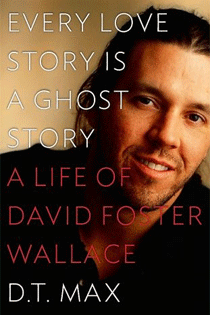By Doug Phillips
The kind of tristesse that is for some people post-coital was for David Foster Wallace life-long, the end of which he cinched, suicidally, in 2008. He was 46. The stomach-level sadness, then, that aches its way through D.T. Max’s much anticipated Life Of also makes the left-of-the-colon title—Every Love Story Is A Ghost Story—hauntingly, appreciably apt.
A nod perhaps to Wallace’s playing peekaboo in Infinite Jest, Max spatchcocks into an endnote the origin of his polysemic title. It turns out that “every love story is a ghost story” is “a thought that stayed with Wallace from the beginning of his writing career to the end,” appearing first in an early letter he wrote while in the MFA program at the University of Arizona, then again some twenty years later in The Pale King, his last novel.
But there’s more to Max’s title than its wingspan, even if, thankfully, he doesn’t indulge in the sort of speculative psychologizing or unverifiable word-parsing that often mars otherwise sound biographies. For Max it’s strictly the facts, to which fifty-plus pages of grateful acknowledging, ample end-noting, Talmudic sourcing, and thorough indexing attest.
Attuned early to the work of Derrida and heavily influenced by same (Wallace would shame his fellow grad students, asking “how they could call themselves fiction writers without having read Derrida”), Wallace recognized and put into practice—via copious footnotes—the notion that few things in life are simply either/or, but almost always both/and, which may help explain why the proposition “every love story is a ghost story” had for him such special appeal. However, what’s especially workable about Max’s title—apart from its thematic muchness—is the way it so suitably frames the arc of Wallace’s professional and personal life, invested as that life was in seeking a love (aesthetically, romantically) impervious to crushing self-doubt (and the ghostly hollowing of suicidal despair that would often follow hard upon), something he felt early and frequently and to the very end.
As a writer, Wallace suffered from what Salinger might call a “craftsman’s ping of reproof,” worrying persistently over what he believed to be a writer’s chief responsibility:
“It’s got something to do with love. With having the discipline to talk out of the part of yourself that can love instead of the part that just wants to be loved.”
With this self-appointed task before him, he set forth to transcend the Pynchon-inspired, meta-fictional monkeyshines of his first novel (The Broom of the System) and early collection of stories (The Girl with Curious Hair) toward writing fiction that would be…
“…a way to go deep inside yourself and illuminate precisely the stuff you don’t want to see or let anyone else see…to tell the truth instead of being a way to escape yourself or present yourself in a way you figure will be maximally likeable.”
Beset by a self-consciousness that threatened always to overwhelm, Wallace also worried over his “likeable” quotient when it came to his relationships, whether with friends, fellow writers, students, or women—the latter of whom, Max reports, were in droves. Despite Wallace’s brilliance in matters of literary art and higher mathematics, he was for most of his life an under-adjusted bachelor, whose penchant for pot and booze quickly—and early—got the better of him. With rehab, however, he managed to keep both at bay, but not the life-long depression that would eventually do him in.
For fans and scholars seeking further intimacy with the life of Wallace, Max delivers—as all good biographers do. Readers will thrill to the kinds of crotchets that will bring them closer to knowing their man: I, for one, now know that Wallace had a fondness for Diet Dr. Pepper, as well as for Bic pens (“If he had lost one that he had written well with, he would retrace his steps until he found it”); I know that early in his writing career he would often listen repeatedly to U2’s “MLK” and Springsteen’s “Born in the USA” while he composed; I know that he thought the two most beautiful opening lines in Western Literature were those to Wittgenstein’s Tractatus and to Crane’s “The Open Boat”; I know that the MFA programs he applied to were Iowa (accepted) and Arizona (accepted, attended) and, perhaps, Johns Hopkins (rejected? No record of his application); I know the names of many of his former lovers; I know that he had affairs with at least a few of his students; I know that he was, by all accounts, an extraordinary teacher.
And knowing this stuff allows me to feel all the more the love of Wallace’s story, alongside of course an irremediable loss, the ghostliness of knowing he’s now four years gone.
Doug Phillips teaches English and American literature at the University of St. Thomas in St. Paul, Minnesota.




